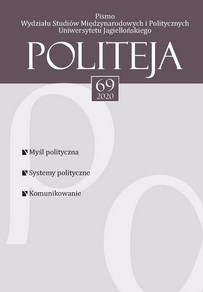POSSIBILITIES OF APPLYING THE CHINESE SOCIAL CREDIT SYSTEM TO COMBAT TERRORISM
POSSIBILITIES OF APPLYING THE CHINESE SOCIAL CREDIT SYSTEM TO COMBAT TERRORISM
Author(s): Dominika DziwiszSubject(s): Human Rights and Humanitarian Law, Civil Society, Government/Political systems, Security and defense, Criminology, Studies in violence and power, ICT Information and Communications Technologies, Peace and Conflict Studies
Published by: KSIĘGARNIA AKADEMICKA Sp. z o.o.
Keywords: Social Credit System; terrorism; international security; Big Data; China;
Summary/Abstract: 2011 saw the start of the pilot phase of the Social Credit System. The societies of democratic states interpreted it as an extreme example of human rights violation. In turn, what is usually forgotten is that the SCS is not the first citizen assessment system, because similar systems have been successfully functioning since 1960s in democratic countries. Scientific analyses of SCS operations are usually limited to its negative consequences. There are fewer attempts by governments of democratic states to assess the use of elements of SCS and algorithmic data analysis, for example in order to increase the level of security of citizens. As a result, this article presents the research hypothesis that elements of the SCS may be successfully applied also in democratic states for the purpose of more effective combating of terrorism. With modern methods of analyzing Big Data sets, it is possible, for example, to accelerate recognition of terrorist networks, support identification of sources of radicalization in online communities and increase the effectiveness of anti-terrorist strategies in order to protect citizens against contemporary terrorist threats. For such a system to be as effective as possible, it should take over some assumptions of the SCS which are explained in this article: Firstly, it should be centralized and controlled by the state. Secondly, the information obtained and processed should be used solely for the purposes of the state security policy, i.e. in the scope smaller than in the case of China. Thirdly, the data should be obtained from multiple sources, public and private ones, in order to increase the accuracy of predictions. Fourthly, the violation of the principles of social coexistence might result in specific penalties, and compliance therewith – in rewards.
Journal: Politeja - Pismo Wydziału Studiów Międzynarodowych i Politycznych Uniwersytetu Jagiellońskiego
- Issue Year: XVII/2020
- Issue No: 69
- Page Range: 183-196
- Page Count: 14
- Language: English

